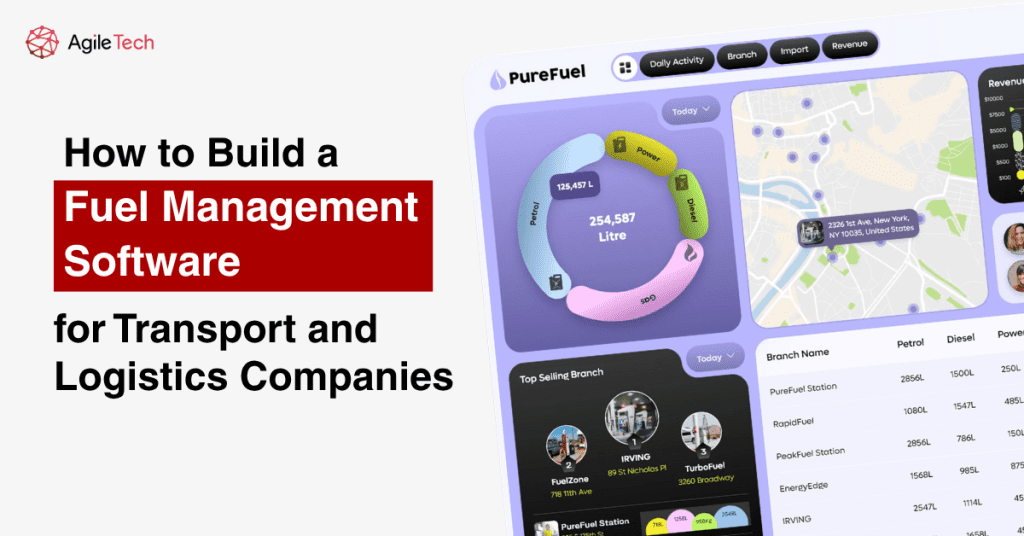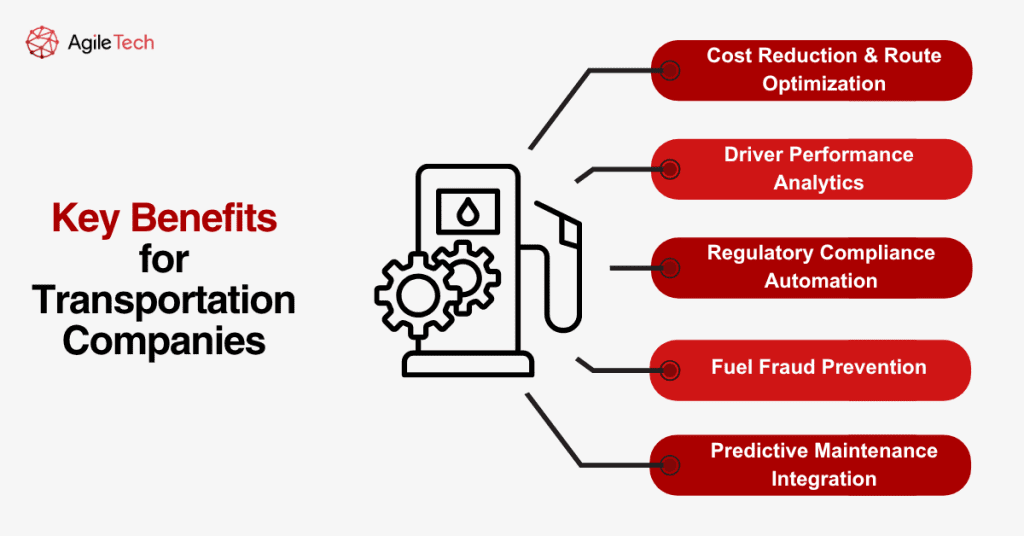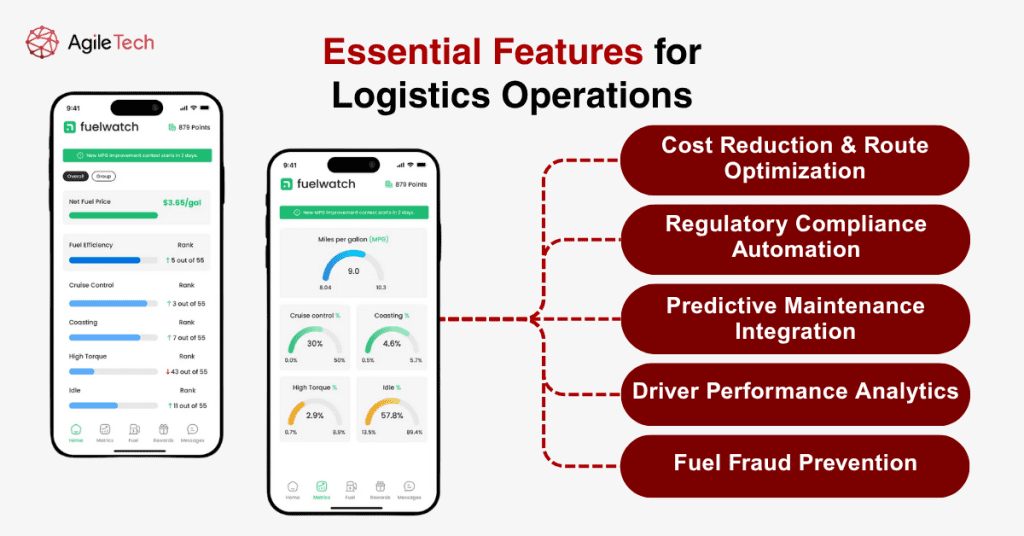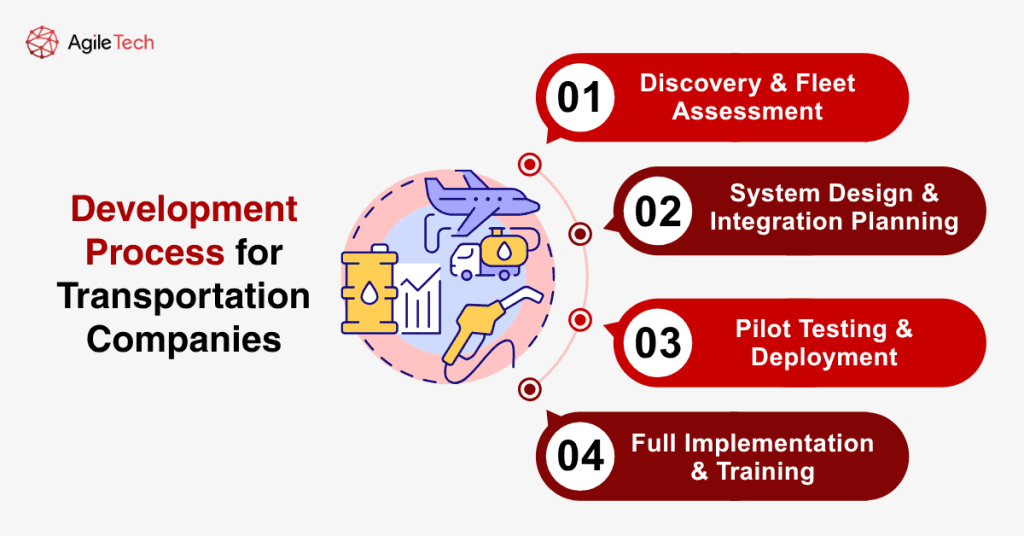How to Build a Fuel Management System Software for Transport and Logistics Companies
In today’s competitive logistics landscape, where fuel costs continue to rise and margins are tighter than ever, efficient fuel management is no longer optional, it’s essential. A custom-built fuel management software solution empowers transport and logistics companies to track fuel consumption in real-time, detect anomalies, prevent fuel theft, and optimize route planning to cut unnecessary expenses.
At AgileTech, we understand the operational pain points logistics companies face, from inaccurate fuel reporting and inefficient route scheduling to the lack of actionable insights. This blog will walk you through the complete process of developing an effective fuel management system, covering everything from industry-specific requirements and system architecture to essential features and post-deployment evaluation. Let’s explore how you can leverage technology to drive operational efficiency, reduce costs, and gain full control over your fleet’s fuel usage.

- 1. Fleet Fuel Management: Essential for Modern Transportation Operations
- 2. What is Fleet Fuel Management Software?
- 3. Key Benefits for Transportation Companies
- 4. Essential Features for Logistics Operations
- 5. Technology Trends in Fleet Management 2025
- 6. Development Process for Transportation Companies
- 7. Technical Architecture Considerations
- 8. Why Choose AgileTech as Your Fuel Management System Software Developers?
- Conclusion
1. Fleet Fuel Management: Essential for Modern Transportation Operations
The transportation industry faces unprecedented challenges in managing operational costs while maintaining efficiency and compliance. Fleet fuel management has emerged as a critical component that can make or break a company’s profitability. With fuel costs representing 20-30% of total operating expenses for most Transportation companies, implementing an effective fuel management system software is no longer optional—it’s essential for survival in today’s competitive market.
Modern fleet fuel management systems have revolutionized how transportation companies monitor and control their fuel expenses. A comprehensive fuel tracking software solution provides the visibility and control needed to optimize operations while reducing costs significantly.
1.1. Market Impact and Cost Considerations
The global fleet management market is experiencing rapid growth, with fleet and fuel management system solutions playing a pivotal role in this expansion. Transportation companies are increasingly recognizing that unmanaged fuel consumption can lead to significant financial losses. Beyond direct fuel costs, poor fuel management results in increased maintenance expenses, regulatory penalties, and operational inefficiencies that compound over time.
Modern fuel consumption control systems can typically reduce fuel costs by 10-20% through optimized routing, driver behavior monitoring, and fraud prevention. For a mid-sized fleet of 100 vehicles, this translates to annual savings of $50,000 to $200,000, making the investment in fuel management system software highly compelling from a return-on-investment perspective.
1.2. Role in Logistics Ecosystem
Fleet fuel monitoring systems serve as the backbone of efficient logistics operations, connecting various aspects of fleet management into a cohesive whole. These systems integrate with route planning software, maintenance scheduling platforms, and driver management tools to create a comprehensive operational overview. The data collected through online fuel management platforms becomes invaluable for strategic decision-making, from vehicle acquisition planning to route optimization and driver training programs.
A well-designed vehicle fuel management system creates synergies across all operational areas, enabling companies to make data-driven decisions that improve overall efficiency while reducing environmental impact.
Read more: What Is a Vehicle GPS Tracking System? How Does It Transform Fleet Management?
2. What is Fleet Fuel Management Software?
2.1. Core Definition for Transportation Context
Fleet fuel management software is a specialized technology solution designed to monitor, analyze, and optimize fuel consumption across an entire vehicle fleet. Unlike simple fuel tracking software tools, comprehensive fuel management system software provides real-time insights into fuel usage patterns, identify inefficiencies, and automate many aspects of fuel-related operations.
A robust fleet and fuel management system typically combines hardware components (such as fuel sensors and telematics devices) with cloud-based analytics platforms to deliver actionable insights. Modern fuel consumption control systems go beyond basic consumption tracking to include predictive analytics, automated reporting, and integration with other fleet management tools.
2.2. Integration với Existing Fleet Systems
A successful fleet fuel management system implementation must seamlessly integrate with existing fleet management infrastructure. This includes Transportation Management Systems (TMS), Electronic Logging Devices (ELD), GPS tracking systems, and maintenance management platforms. The integration capability determines how effectively the vehicle fuel management system can contribute to overall operational efficiency.
API-based integrations allow online fuel management systems to share data bidirectionally with other platforms, creating a unified view of fleet operations. This connectivity enables automated workflows, such as triggering maintenance alerts based on fuel efficiency degradation or adjusting route plans based on real-time fuel consumption data from the fuel tracking software.
3. Key Benefits for Transportation Companies

3.1. Cost Reduction & Route Optimization
The primary benefit of implementing fuel management system software lies in significant cost reduction through intelligent route optimization. Advanced algorithms analyze historical fuel consumption data, traffic patterns, and vehicle performance metrics to suggest optimal routes that minimize fuel usage while maintaining delivery schedules.
Dynamic route optimization through fleet fuel monitoring systems adjusts plans in real-time based on changing conditions such as traffic congestion, weather, or unexpected delays. This adaptive approach can reduce fuel consumption by 15-25% compared to static routing methods, while also improving customer satisfaction through more reliable delivery times.
3.2. Driver Performance Analytics
Driver behavior significantly impacts fuel consumption, with aggressive driving habits potentially increasing fuel usage by 20-40%. Fleet and fuel management systems provide detailed analytics on individual driver performance, identifying behaviors such as excessive idling, harsh acceleration, and inefficient speed management.
The fuel tracking software generates personalized coaching recommendations for each driver, highlighting specific areas for improvement. Companies implementing driver performance programs through fuel consumption control systems typically see 10-15% improvement in fuel efficiency within the first six months, along with reduced vehicle wear and lower accident rates.
Read more: Reducing Downtime by 40% with an Intelligent Vehicle Fleet Management System
3.3. Regulatory Compliance Automation
Transportation companies face complex regulatory requirements related to fuel usage reporting, emissions tracking, and tax compliance. Vehicle fuel management systems automate many of these compliance processes, reducing the administrative burden while ensuring accuracy and timeliness of required reporting.
Automated compliance features in fleet fuel management systems include IFTA (International Fuel Tax Agreement) reporting, emissions calculations for environmental regulations, and maintenance of detailed audit trails. This automation reduces compliance costs while minimizing the risk of penalties from regulatory violations.
3.4. Fuel Fraud Prevention
Fuel theft and fraud represent significant hidden costs for many transportation companies. Online fuel management systems provide multiple layers of protection against fraudulent activities, including real-time monitoring of fuel transactions, anomaly detection algorithms, and detailed transaction logging.
Advanced fuel tracking software can identify suspicious patterns such as fuel purchases that don’t align with vehicle locations, unusual consumption spikes, or unauthorized fuel card usage. Early detection of fraudulent activities through fleet fuel monitoring systems can save companies thousands of dollars monthly while protecting against more sophisticated theft schemes.
3.5. Predictive Maintenance Integration
Fuel efficiency often serves as an early indicator of vehicle maintenance needs. Fuel consumption control systems can identify gradual increases in consumption that may signal engine problems, tire issues, or other maintenance requirements before they become critical failures.
Predictive maintenance integration through fuel management system software allows companies to schedule maintenance proactively based on fuel efficiency trends, reducing unexpected breakdowns and extending vehicle lifespan. This approach typically reduces maintenance costs by 20-30% while improving vehicle reliability and safety.
4. Essential Features for Logistics Operations

4.1. Real-time Fleet Monitoring
Modern fleet and fuel management systems must provide comprehensive real-time monitoring capabilities that give fleet managers instant visibility into fuel consumption across their entire operation. This includes live tracking of fuel levels, consumption rates, and efficiency metrics for individual vehicles and the fleet as a whole.
Dashboard interfaces in vehicle fuel management systems should present this information in easily digestible formats, with customizable alerts for unusual consumption patterns, low fuel levels, or efficiency degradation. Mobile accessibility ensures that fleet managers can monitor operations from anywhere through online fuel management platforms, enabling quick responses to emerging issues.
4.2. Multi-Route Fuel Analytics
Transportation companies often manage multiple routes with varying characteristics, from urban delivery routes to long-haul interstate operations. Fleet fuel monitoring systems must provide granular analytics for different route types, allowing managers to optimize fuel usage strategies for each operational scenario.
Route-specific analytics through fuel tracking software help identify the most fuel-efficient vehicles for particular routes, optimal departure times to avoid traffic congestion, and opportunities for route consolidation or modification. This detailed analysis enables data-driven decisions that improve overall fleet efficiency through fuel consumption control systems.
4.3. TMS/ELD Integration
Seamless integration with Transportation Management Systems and Electronic Logging Devices is crucial for comprehensive fleet management. These integrations provide context for fuel consumption data, linking it to specific loads, customer deliveries, and driver hours-of-service requirements through the fuel management system software.
Combined data from TMS and ELD systems enables advanced analytics such as fuel consumption per mile per ton of cargo, efficiency comparisons across different load types, and optimization of driver schedules to minimize fuel usage while maintaining compliance with hours-of-service regulations. This integration makes the vehicle fuel management system a central hub for operational intelligence.
4.4. Cross-border Tax Management
For transportation companies operating across state or national borders, fuel tax management represents a complex compliance challenge. Advanced online fuel management systems automate the calculation and reporting of fuel taxes for multiple jurisdictions, ensuring accurate tax payments while maximizing available credits and deductions.
Cross-border tax management features in fleet fuel management systems include automatic jurisdiction detection based on GPS data, real-time tax rate updates, and integration with government reporting systems. This automation reduces the risk of costly tax penalties while minimizing administrative overhead through fuel tracking software capabilities.
4.5. Driver Behavior Tracking
Comprehensive driver behavior tracking goes beyond simple fuel consumption monitoring to include detailed analysis of driving patterns that impact efficiency. Fleet fuel monitoring systems track acceleration and deceleration patterns, speed management, idling time, and route adherence.
The fuel consumption control system should provide both individual driver scorecards and fleet-wide performance metrics, enabling targeted coaching programs and recognition of top-performing drivers. Gamification features can encourage friendly competition among drivers while promoting fuel-efficient driving habits through the vehicle fuel management system interface.
5. Technology Trends in Fleet Management 2025
5.1. Electric Vehicle Integration
The transition to electric vehicles is accelerating across the transportation industry, requiring fleet and fuel management systems to evolve beyond traditional fuel tracking. Modern fuel management system software must accommodate hybrid and fully electric vehicles, providing energy consumption analytics, charging station optimization, and battery performance monitoring.
Electric vehicle integration in fuel tracking software includes features such as charging cost analysis, optimal charging scheduling based on electricity rates, and range optimization for route planning. As fleets become increasingly diverse in their power sources, online fuel management platforms must provide unified analytics across all vehicle types.
5.2. AI-powered Optimization
Artificial intelligence and machine learning are revolutionizing fuel management through predictive analytics and automated optimization. AI algorithms in vehicle fuel management systems can identify complex patterns in fuel consumption data that human analysts might miss, providing recommendations for route optimization, vehicle assignment, and maintenance scheduling.
Machine learning models in fleet fuel monitoring systems continuously improve their accuracy by analyzing historical data and real-world outcomes, enabling increasingly sophisticated optimization strategies. These AI-powered fuel consumption control systems can adapt to changing conditions automatically, maintaining optimal efficiency without constant manual intervention.
5.3. 5G Connectivity Benefits
The rollout of 5G networks is enabling new capabilities in fleet fuel management through ultra-low latency communication and increased data bandwidth. This enhanced connectivity supports real-time video analytics, immediate alert systems, and more sophisticated telematics data collection in fuel tracking software.
5G connectivity enables features such as real-time traffic optimization, instant fraud detection alerts, and enhanced driver coaching through immediate feedback systems in fuel management system software. The increased bandwidth also supports more comprehensive data collection through online fuel management platforms, enabling deeper insights into fleet operations.
6. Development Process for Transportation Companies

6.1. Discovery & Fleet Assessment
The development process begins with a comprehensive assessment of the company’s current fleet operations, fuel management challenges, and technological infrastructure. This discovery phase involves analyzing historical fuel data, identifying pain points in current processes, and defining specific objectives for the fleet and fuel management system.
Key activities include fleet size and composition analysis, current fuel consumption patterns evaluation, existing technology integration requirements assessment, and stakeholder interviews to understand user needs and expectations. This foundation ensures that the developed fuel management system software addresses real operational challenges rather than generic features.
6.2. System Design & Integration Planning
Based on the discovery phase findings, the system design process focuses on creating a solution that integrates seamlessly with existing operations while providing the functionality needed to achieve fuel management objectives. This includes selecting appropriate hardware components, designing user interfaces, and planning API integrations for the vehicle fuel management system.
Integration planning must consider current systems, future expansion requirements, and data migration needs. The design should prioritize scalability and flexibility to accommodate fleet growth and evolving operational requirements in fleet fuel monitoring systems.
6.3. Pilot Testing & Deployment
A phased implementation approach reduces risk and allows for system refinement based on real-world usage. Pilot testing typically involves implementing the fuel tracking software on a subset of the fleet, allowing for thorough testing of all features and identification of any issues before full deployment.
During the pilot phase, user feedback is collected and incorporated into system improvements for the fuel consumption control system. Performance metrics are established to measure the system’s effectiveness in achieving fuel management objectives, providing data to support decisions about full-scale deployment of the online fuel management platform.
6.4. Full Implementation & Training
Full implementation requires careful planning to minimize disruption to ongoing operations. This includes scheduling hardware installation, migrating historical data, and conducting comprehensive training programs for all users of the fleet fuel management system.
Training programs should be tailored to different user roles, from fleet managers who need comprehensive knowledge of the fuel management system software to drivers who interact with specific features. Ongoing support and additional training ensure that users can fully leverage the vehicle fuel management system capabilities as they become more familiar with its features.
7. Technical Architecture Considerations
7.1. Cloud Infrastructure Requirements
Modern fleet and fuel management systems require robust cloud infrastructure to handle the continuous data streams from multiple vehicles, process complex analytics, and provide reliable access to users across different locations. Cloud architecture should prioritize scalability, reliability, and security while maintaining cost-effectiveness for fuel tracking software operations.
Key infrastructure considerations include data storage capacity for historical fuel consumption data, processing power for real-time analytics, redundancy for system reliability, and global content delivery networks for fast access from different geographic locations through online fuel management platforms.
7.2. API Integration Capabilities
The ability to integrate with existing systems is crucial for fuel management system software success. Well-designed APIs enable seamless data exchange with TMS, ELD, GPS tracking, and maintenance management systems, creating a unified fleet management ecosystem through vehicle fuel management system connectivity.
API design should follow industry standards for security and reliability, with comprehensive documentation and support for common integration scenarios. Rate limiting, authentication, and error handling ensure that integrations remain stable and secure over time in fuel consumption control systems.
7.3. Security for Fleet Data
Fleet fuel consumption data represents sensitive business information that requires robust security measures. Security architecture must address data encryption, access controls, audit logging, and compliance with relevant data protection regulations for fleet fuel monitoring systems.
Multi-layered security approaches include encryption of data in transit and at rest, role-based access controls, regular security audits, and compliance with industry standards such as SOC 2 Type II. Regular security updates and monitoring ensure ongoing protection against emerging threats in fuel tracking software platforms.
8. Why Choose AgileTech as Your Fuel Management System Software Developers?
AgileTech brings specialized expertise in developing comprehensive fuel management solutions tailored to the unique needs of transportation companies. Our team combines deep understanding of logistics operations with cutting-edge technology capabilities to deliver systems that drive real operational improvements.
Our development approach prioritizes user experience, system reliability, and seamless integration with existing fleet management infrastructure. We understand that fuel management systems must provide immediate value while supporting long-term operational growth and evolution.
With a proven track record of successful implementations across diverse fleet types and sizes, AgileTech delivers solutions that adapt to your specific operational requirements while providing the scalability needed for future growth. Our ongoing support and system enhancement services ensure that your fuel management system continues to deliver value as your operations evolve.
Conclusion
Building an effective fleet fuel management system requires careful consideration of operational requirements, technology capabilities, and integration needs. The investment in comprehensive fuel management software typically pays for itself within the first year through cost savings and operational improvements.
Success depends on selecting the right development partner who understands both the technical challenges and operational realities of fleet management. With proper planning, implementation, and ongoing optimization, fuel management systems become invaluable tools that drive profitability and operational excellence in modern transportation operations.
The future of fleet fuel management lies in increasingly sophisticated analytics, AI-powered optimization, and seamless integration with evolving vehicle technologies. Companies that invest in comprehensive fuel management solutions today position themselves for success in an increasingly competitive and regulated transportation industry.